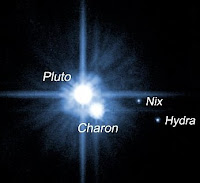Exoplanets "out there" may actually decide the fate of our poor Pluto, who has been the subject of much heated debates.
 As everyone knows, Pluto is no longer considered a planet by the IAU. Why? Because some folks decided that a planet must satisfy three conditions to be considered as a planet:
As everyone knows, Pluto is no longer considered a planet by the IAU. Why? Because some folks decided that a planet must satisfy three conditions to be considered as a planet:1) It must orbit a star
2) It must have a round shape
3) It must clear its path of any other object.
Now the third condition is where Pluto fails as a "legitimate" planet, IAU says.
But that's where the newly-discovered exoplanets enter the picture: The discovery of a pair of exoplanets named HD 45364 b & HD 45364 c, the third condition may come under question more than ever.

HD 45364 b|c actually share orbits at times! Their orbits sometimes touch and may even overlap. They don't collide because they have resonant orbits. They revolve around an orange dwarf star named HD 45364 in the constellation of Canis Major, about 110 light years from Earth. The inner planet completes three orbits around its star in the same time it takes the outer planet to complete two orbits (3:2). Therefore, the inner planet at times lies further from the star than the outer planet--just like Neptune and Pluto.
Both of HD 45364's planets are giants; the inner planet is at least 3.5 times the mass of Neptune. The outer planet is more massive, at least 2.2 times the mass of Saturn. Now if we stick with the IAU's definition, neither of these objects would be considered planets, as they do not "clear their orbits" of one another.

The IAU might have made a terrible mistake of deciding too early and hastily declaring a definition of a planet before even considering what might be "out there"--that perhaps we need more samples of other solar systems before deciding what a planet is or is not.
I remember the mantra of Murray Gell-man, about the beauty of things. Truth and Elegance often displays beauty. In my opinion, the third definition of a planet invented by IAU was not pretty. And the havoc and embarassment it wreaked upon the Astronomy community is really quite ugly.
Frankly, I don't see any problem with the number of planets ballooning to thousands if Pluto opens the floodgates to Planethood. It's the petabyte age, baby! Perhaps it's much simpler to see things in large numbers.
Personally, I am prepared with the list of planets or exoplanets numbering up to billions. I'll be long gone by the time the exocatalog even hits six figures, but it's inevitable. The night sky and outer space is a whole database waiting to be known. There's no need to be scared of numbers.
At times, simplicity can be achieved by looking at sheer numbers. But complexity arises with too little data (Talk about paradox!). So in our case, IAU decided what a planet is based on one sample: Our Solar System.
Even as the wonderful International Year of Astronomy unfolds for 2009, Pluto is truly living up to it's name as one of the alternate names of Hades, the Greek god of the Underworld. Pluto is truly having a blast.
With enough exoplanet discoveries, it would soon turn out to be such a simple thing to re-define what a planet is.
"Wanderer" is a pretty good word to begin with, don't you think so?
Links:
http://kencroswell.com/HD45364.html
http://laurele.livejournal.com/7854.html
